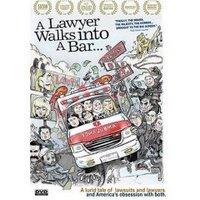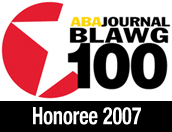Allow me to mount my high horse for this post and complain about a practice I see with increasing frequency among legal bloggers. Just this week, I have come across several law-related blogs that consist entirely or almost entirely of posts taken from other sources. Of itself, that is not objectionable. But what bothers me is that these blogs are reprinting entire articles, often from legal periodicals or Web sites, while making the posts appear to be original to the blog.
I don't want to name names here, but let me offer one example. The blog purports to be that of a company that provides services to the legal profession. All posts are "signed" by the blog's author and relate to the company's services. But virtually every post is the full text of an article taken from another source. The blog does nothing to indicate this. It does not introduce the piece with an explanatory note and it uses no quotation marks or indentation to suggest it is taken from elsewhere. Only if you click through to the second page of the post and read to the very bottom is the source attributed. Granted, this is better than no attribution, but it is misleading and sure to confuse many readers.
In another example, the blog is purportedly written by two authors, both of whom provide services to the legal profession. The blog's description makes it sound as if its posts are the authors' observations. Here again, virtually all recent posts are taken in full from sources such as Law.com. This blog does better than the other, in that it identifies the source at the bottom of the post on the first page, rather than at the bottom on the second page. Again, however, no introduction identifies the article as from elsewhere and no quotes are used to show this.
I have no idea whether these blogs obtained permission to reprint these articles. I would hope most bloggers understand enough about copyright law to know that it is improper to reprint an entire article without the copyright owner's permission. Fair use permits bloggers to quote excerpts from articles, and most bloggers are good about identifying the source, linking to the source and using quotation marks or indentations to identify the text as a quotation.
Beyond copyright, my belief is that bloggers should be fully transparent about their sources. The blogs I describe above could take a few small steps to remedy their lack of transparency. Assuming they have proper permission to reprint these articles, they should:
- Insert an editor's note at the top of the post identifying the source. This need not be overly formal, just something along the lines of, "Here is an article from Law.com that I thought you'd find interesting. It was written by John Lawyer and is reprinted here with permission."
- Use quotation marks, indentation or some typographical device to distinguish quoted text from your own comments.
- Include a link back to the original article.
Having said all that, my preference is for bloggers to use "tantalizing tidbits" from the original article and then link back to the full text at its original location. If the article is worthwhile, why not give the original publisher the hits?






 Robert J. Ambrogi is a
Robert J. Ambrogi is a 




